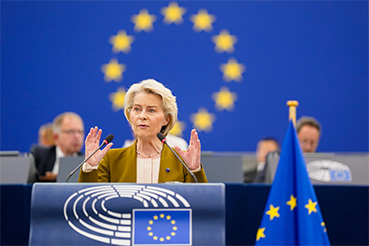The State of the Union speech delivered on 10 September by the President of the European Commission, Ursula von der Leyen, generated explicit reactions from organisations in the social economy and the third sector. CECOP (Confederation of Industrial and Service Cooperatives), Philea (the European philanthropy association) and AIM (International Association of Mutuality) welcomed with interest several announcements concerning quality employment, affordable housing, innovation financing and public health.
Von der Leyen placed security, competitiveness, and the green and digital transitions at the centre of her address; she announced, among other measures, a Single Market roadmap until 2028, a package to boost technological scaleups, and social initiatives such as a European Anti-Poverty Strategy, a Quality Jobs Act and an Affordable Housing Plan. For the organisations consulted, these initiatives open up opportunities, but only if they are translated into rules, resources, and clear conditions.
A speech with social overtones, but calling for words to be turned into action
CECOP welcomed the proposal of a Quality Jobs Act and the inclusion of the knowledge and innovation dimension in the Single Market roadmap, but warned that such ambition must be translated into concrete action: removal of legal and financial barriers for cooperative enterprises, explicit inclusion of education in the so-called “fifth freedom” of the Single Market, and social criteria in public procurement. Giuseppe Guerini, President of CECOP, stressed that “now is the time to act, not merely to state principles”, and called for clear indicators and the application of social criteria in the allocation of contracts and public funds.
AIM, for its part, welcomed the announcement of the Global Health Resilience Initiative (mentioned by the Commission following the speech) as a sign of European leadership in health preparedness and response. The association argued that mutual organisations must be integrated as “essential partners” in this initiative: “mutuals,” AIM argued, “are close to communities and have expertise in equity and prevention, and can therefore help strengthen the resilience of health systems and combat vaccine misinformation.” The organisation expressed its willingness to work closely with the Commission to turn the proposal into concrete programmes.
Democratic resilience and reconstruction
Finally, Philea published an analysis identifying relevant opportunities for the philanthropic sector. The Savings & Investments Union, the Scaleup Europe Fund and housing and employment policies could open avenues for collaboration between foundations and public administrations.
However, Philea warned that the rhetoric about “democratic resilience” and “reconstruction” must be backed up by budgets and frameworks that allow foundations to act as co-investors and partners in social impact programmes. In its note, the association explicitly recommended that future policies recognise foundations and social economy organisations within the financial architecture of the Single Market.
Convergences and tensions: competitiveness vs. social justice
The three organisations share a common assessment: the speech includes useful measures for competitiveness and security — areas the Commission is reinforcing — but leaves uncertainties as to how social protection and territorial cohesion will be preserved or strengthened. CECOP and Philea underline the need for instruments such as the Scaleup Fund or the Single Market roadmap to explicitly incorporate clauses favouring social economy entities, universal access to essential services, and social sustainability criteria in public procurement. AIM, for its part, emphasises the urgency of turning the health initiative into funding lines and operational frameworks that include local mutual actors.







